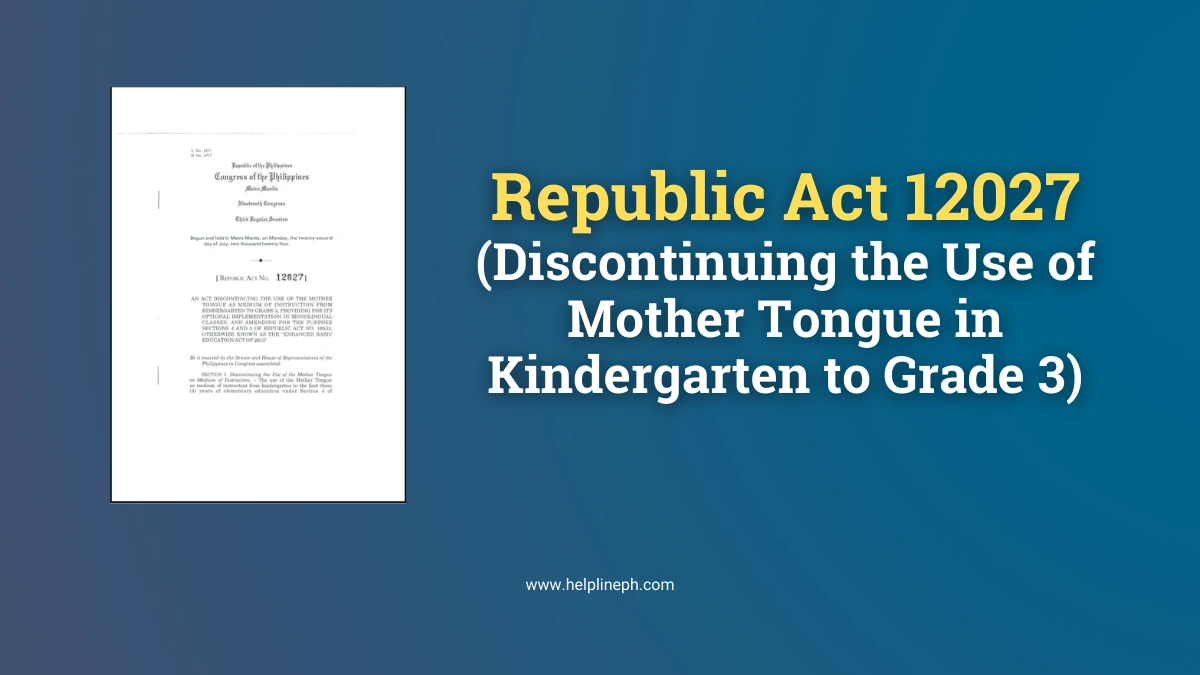Republic Act 12027, which aims to discontinue the use of the mother tongue as the primary medium of instruction from Kindergarten to Grade 3, has officially become law. This happened after President Ferdinand Marcos Jr. did not sign the bill within 30 days, allowing it to lapse into law.
The law has stirred discussions among educators, parents, and policymakers because it represents a shift in the country’s educational approach. In this article, we’ll explore what Republic Act 12027 means for students, teachers, and schools. We’ll also discuss the possible advantages and challenges that come with its implementation.
What is Republic Act 12027?
Republic Act 12027 is a new law that changes the language used to teach students in Kindergarten to Grade 3. Under this law, Filipino and English will now be the main languages used in teaching instead of the students’ mother tongue. However, in monolingual classes, where students all speak the same language, the mother tongue can still be used, but this is optional.
The law also states that regional languages will still be used as an auxiliary medium of instruction. This means that, in certain cases, regional languages can help in teaching, but the focus will be on Filipino and English.
Republic Act 12027 is a combination of House Bill 6717 and Senate Bill 2457. These two bills were passed by the House of Representatives and the Senate before being sent to the President for approval on September 9. Since the President did not act on it within 30 days, the law automatically took effect.
Why was Republic Act 12027 Passed?
The passage of Republic Act 12027 addresses concerns about the effectiveness of using the mother tongue as the medium of instruction. The Mother Tongue-Based Multilingual Education (MTB-MLE) program, which was implemented through the K to 12 curriculum, aimed to help young learners understand lessons better by using the language they speak at home. However, there were challenges:
- Lack of resources: Many schools struggled to find learning materials in the different local languages.
- Teacher training: Teachers needed more support and training in teaching in multiple languages, especially in regions with several dialects.
- Diverse languages: The Philippines has over 170 languages, making it difficult to create standardized learning materials for every language.
Due to these issues, many educators and experts believed that it would be better to focus on Filipino and English, which are already widely spoken and understood across the country.
What Does This Mean for Schools and Teachers?
With Republic Act 12027 now in place, teachers will need to adjust their teaching methods. Instead of using the mother tongue for lessons, they will now use Filipino and English as the main languages for teaching. This change could require new learning materials and lesson plans.
However, in some cases, where students in a class all speak the same language, schools can choose to continue using the mother tongue as an optional teaching tool. This flexibility allows schools in more remote areas, where students might be more comfortable with their local language, to still benefit from the mother tongue in some way.
Additionally, regional languages can still play a role in classrooms as a support language. For example, if students struggle to understand a lesson in Filipino or English, teachers can use their regional language to explain concepts.
Benefits of Republic Act 12027
There are several reasons why some educators and policymakers believe that Republic Act 12027 is a positive development:
- Uniformity: By using Filipino and English as the primary teaching languages, there will be more consistency across schools in the country. This could help improve the quality of education, as students from different regions will have access to the same learning materials.
- Preparation for higher education: Filipino and English are the main languages used in higher education. By starting students early with these languages, it may be easier for them to transition to higher grades and eventually, college.
- Global competitiveness: English is an international language, and many believe that improving students’ English skills early will help them become more competitive in the global job market.
Challenges of Republic Act 12027
While there are benefits, Republic Act 12027 also poses challenges, especially for students and teachers who are used to the previous system:
- Learning gap: Some students, especially those from rural areas, may struggle to understand lessons in Filipino or English, which are not their first languages. This could affect their ability to learn effectively in the early grades.
- Teacher preparedness: Teachers who were trained to use the mother tongue as the medium of instruction may need additional training to adjust to the new system. This could take time and resources.
- Cultural impact: The use of the mother tongue in education helps preserve local languages and cultures. By focusing on Filipino and English, there is a concern that the importance of regional languages might decline over time.
What’s Next?
Republic Act 12027 will now be implemented in schools across the country, but it might take some time for the changes to fully take effect. Schools will need to prepare new materials and train teachers to make sure that they can teach effectively in Filipino and English.
Educators, parents, and students will need to work together to ensure that the transition is smooth. While the change may come with challenges, the goal is to improve the quality of education and better prepare students for their future.
Frequently Asked Questions (FAQs)
What is Republic Act 12027?
Republic Act 12027 is a law that stops the use of the mother tongue as the main language for teaching from Kindergarten to Grade 3. Instead, Filipino and English will be used.
Why was the mother tongue removed as the medium of instruction?
The use of the mother tongue faced challenges, such as the lack of resources and teacher training. Filipino and English are seen as more effective for providing a consistent and standardized education.
Can schools still use the mother tongue?
Yes, in monolingual classes where students all speak the same language, the mother tongue can still be used, but it is optional.
What will happen to regional languages?
Regional languages can still be used as an auxiliary medium of instruction. This means they can help explain lessons but are not the main teaching language.
What are the benefits of Republic Act 12027?
The law aims to improve the uniformity of education, prepare students for higher education, and enhance their global competitiveness by focusing on Filipino and English.
In conclusion, Republic Act 12027 marks a significant change in the Philippine education system. While it brings potential benefits, like improving uniformity and global competitiveness, it also poses challenges, particularly in regions where students are more comfortable with their mother tongue. The success of this law will depend on how well schools and teachers adapt to the new system.






